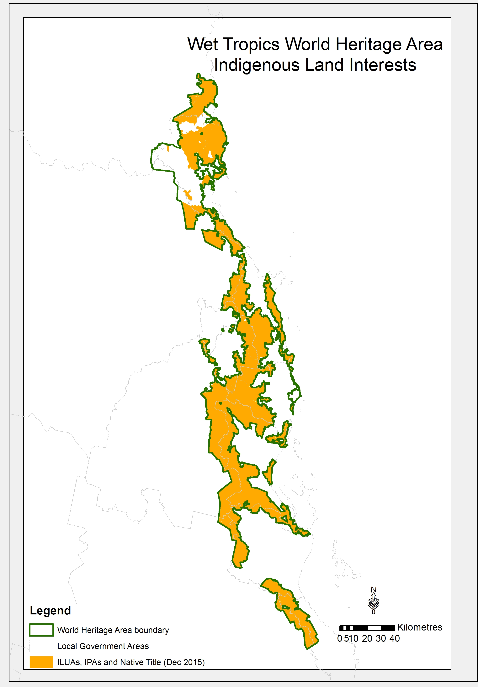
- Wet Tropics Management
- Legislative framework
- Management partnerships
- Sustainable Tourism Plan
- Threats to the Area
- Research and a Learning Landscape
- How can I help?
-3.png)
As one of the world’s oldest living and evolving cultures, Rainforest Aboriginal Peoples’ unique traditions are richly entwined with the Area, having lived continuously in the rainforests of the Wet Tropics region for many thousands of years.
This is the only place in Australia where Aboriginal peoples permanently lived in a tropical rainforest environment. The rainforest provided everything: spirituality, identity, social order, shelter, food and medicine. Rainforest Aboriginal Peoples' had an economic system in place that involved the bartering of resources amongst different tribal groups.
The sharing of stories, the use of language, and the performance of songs and dances are still very important. These activities maintain Rainforest Aboriginal Peoples' unique evolving cultural identity and connection to Country.
For Rainforest Aboriginal Peoples, connection to Country means ongoing responsibility for caring for Country in all its different dynamics—a responsibility for, and involvement in, the maintenance of its cultural significance, sacred sites, and cultural heritage for all future generations of Rainforest Aboriginal Peoples.
Today, there are more than 20 Rainforest Aboriginal groups with ongoing traditional connections to land in the Wet Tropics World Heritage Area.
Native title determined areas and other Rainforest Aboriginal land interests cover 81.6% of the Wet Tropics World Heritage Area. There are currently 21 registered native title bodies corporate (RNTBCs) operating in the Area in addition to a number of other native title applicant groups who are still working through their native title processes.
Overlapping Rainforest Aboriginal land interests in the Wet Tropics World Heritage Area include:
Native title recognises, under common law, a set of rights and interests over land or waters where Aboriginal people practised traditional lore and customs prior to European settlement. This may include but is not limited to hunting, gathering and fishing.
Where native title is determined, it sets out procedural rights and/or compensation for future acts that may effect native title. A future acts regime provides guidance on the procedures that must be followed to ensure any future acts can be done validly through negotiation with the native title parties.

Prescribed bodies corporate (PBCs) are corporations that have been formed to represent the Rainforest Aboriginal Peoples who have had determinations of native title on their traditional lands. PBCs become registered native title bodies corporate (RNTBCs) when they are registered with the National Native Title Tribunal. They are the first point of contact for native title matters.
A number of PBCs and RNTBCs are also registered cultural heritage bodies under the Cultural Heritage Act 2003. They are the first point of contact for cultural heritage matters.
To connect with Rainforest Aboriginal Peoples of the Wet Tropics, search online (e.g. via a search engine like Google) for current contact details using the relevant group names listed in the map at the top of this page. You can also search on the Office of the Registrar of Indigenous Corporations website.
There are two land councils that cover the Wet Tropics World Heritage Area:
Land councils are recognised as native title representative bodies under the Native Title Act 1993 and play an important role in protecting and securing native title interests for Rainforest Aboriginal Peoples.
There are two Aboriginal shire councils within the Wet Tropics World Heritage Area that are now local governments under the Local Government Act 2009:
Aboriginal shire councils are responsible for essential services, infrastructure and housing. They have a strong commitment to ensuring essential community services are available and accessible to all members of the community.